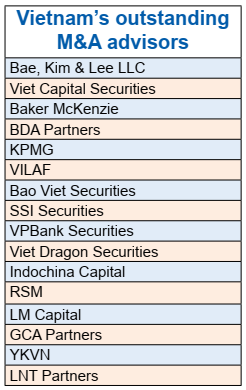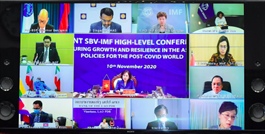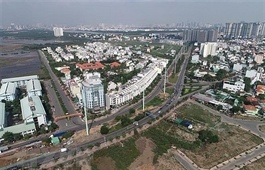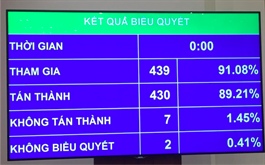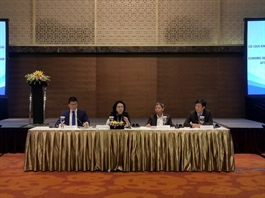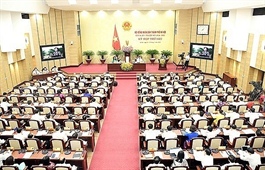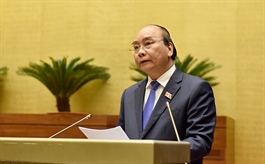Vietnam looks to kick-start rejuvenation of M&A deals
Vietnam looks to kick-start rejuvenation of M&A deals
Out of the blue, the COVID-19 outbreak has upended everyone’s expectations of a promising 2020. The turmoil, coupled with the US presidential election, has severely impacted mergers and acquisitions appetite in the global market, but Vietnam is still emerging as an appealing destination for foreign funds.
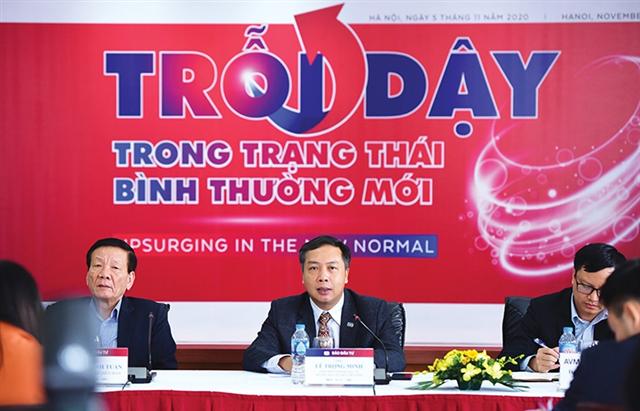
VIR editor-in-chief Le Trong Minh (middle) emphasised the bright prospects of M&A in Vietnam at the M&A Forum press conference last week, photo Dung Minh
|
The ongoing pandemic has caused a decline of 25 per cent in mergers and acquisitions (M&A) deal valuation across the world in the first half of this year.
In Vietnam, total M&A deals in 2019 reached $7.2 billion, but due mainly to COVID-19, this year’s figure is projected to decrease to $3.4 billion, equivalent to 48.6 per cent of last year, cited from Vietnam M&A Forum Research Group (MAF Research).
Meanwhile, the Corporate Investment and Merger and Acquisition Centre - the co-founder of Vietnam M&A Forum - forecast the market to rebound following a V-shaped trajectory during 2021-2022, hitting $4.5-5 billion in 2021 and $7 billion in 2022.
According to Prof. Ha Ton Vinh, chairman of consultancy Stellar Management Corporation, and former White House political appointee under Reagan and Bush administration, Donald Trump and Joe Biden offer a resoundingly distinct choice on economic and regulatory issues.
“In the first two years of Biden’s administration, he could revert many of Trump’s policies. In a broader context, Biden’s economic policies would likely be more conventional than Trump’s, especially regarding collaboration with US allies around the world. Hence, the Trans-Pacific Partnership, which Trump withdrew from in 2017, might be resumed. Either way, the Vietnamese economy will still benefit, which equals to a good impetus for M&A activities in general,” Vinh said at the press conference announcing Vietnam M&A Forum 2020 in Hanoi on November 5.
Revitalised ventures
|
Talking with VIR, Nguyen Thi Van Khanh, senior director of Capital Markets at JLL Vietnam, said that the unprecedented public health challenges have been a bitter pill to swallow for many financiers, and it will undoubtedly have a temporary negative effect on the industry as a whole. However, in the current low interest rate environment, many corporations such as Vinhomes, Masan, and Novaland opt for issuing corporate bonds as an effective mobilisation channel.
“High investor demand is fuelling corporate bond issuance. In 2021, we predict that investors from South Korea, Japan, and Singapore will likely continue showing keen interest and strong commitment in Vietnamese property M&A due to the market’s vast potential,” Khanh said.
MAF Research stated that Danh Khoi Group is one of the most talked-about names this year as it bet big on revitalising “hibernating” tourism-related projects. One notable example is the group’s full acquisition of a subsidiary of Tokyo-headquartered Sun Frontier Fudousan to officially become the investor of the Sun Frontier project in the central city of Danang. The deal is roughly worth $920 million – the single highest valuation in the property market recently.
From June 2019 to September 2020, the real estate sector accounted for nearly 40 per cent of the M&A market in Vietnam, as shown by MAF Research.
Pham Mai Huong, director of Deal Advisory at KPMG Vietnam, emphasised that M&A deals are still appreciated for their ability to add value for the buy-side’s ecosystem. For example, Masan Consumer Holdings acquired Vingroup’s VinCommerce and VinEco to establish a leading consumer retail group by accessing a network of nearly 3,000 supermarkets and convenience stores nationwide.
As one of the leading M&A advisors globally and locally, KPMG has adapted to the new normal, with virtual meetings becoming an essential part to speed up M&A deal-making.
“Notwithstanding, challenges still colour the landscape, particularly physical constraints for cross-border deals because international flights has become highly restricted. These difficulties have slowed down deal execution due to the lack of physical observations and in-person negotiations. Unfortunately, the outbreak will prolong deal processes and make them more difficult to complete, especially for foreign investors,” Huong explained to VIR.
Consumer market experience
Vu Le Trung, partner at Vietnam International Law Firm, said that he had been involved in the tie-up deals of Japanese Shinsei Bank acquiring 49 per cent of MCredit – the consumer finance arm of Military Bank – and Sumitomo Mitsui Trust Bank’s acquisition of 49 per cent equity in BIDV Financial Leasing Company.
“I believe the Vietnamese financial landscape is a fertile land for foreigners, especially when a lack of capital still ails some local lenders. However, potential suitors might be held back by the 30-per-cent foreign ownership cap in the banking sector in Vietnam. On the flip side, consumer finance is still shining bright, enticing many high-profile investors,” he added.
According to the Ministry of Finance, the scale of the consumer finance market in 2019 came to around VND1 quadrillion ($43.47 billion) from just VND646 trillion ($28 billion) in 2016, accounting for 11.4 per cent of the country’s total outstanding balance. The Vietnamese government’s strong ambition to crack down on shadow banking and loan sharks is slated to propel the market’s further development.
Fresh data from market research firm FiinGroup shows that for the first time in a decade, the Vietnamese consumer finance market experienced single-digit growth (9.2 per cent on-year in the first half of 2020), following aggressive credit growth over the past few years. This is attributed to the dual challenge of the COVID-19 pandemic and tightening regulations on cash loans. However, despite the modest growth rate, Vietnamese consumer finance maintained a contribution of over 20 per cent of the country’s loan books.
According to SSI Asset Management, a subsidiary of Vietnamese brokerage SSI Securities and Japan’s Daiwa Corporate Investment Asia, Vietnam has consistently been one of the fastest-growing economies in the world and the region’s top foreign investment destination. Healthy twin account surpluses with increasing foreign exchange reserves, improving the local banking sector with stable interest rate and inflation, provide Vietnam macroeconomic stability and a stronger local currency. Extremely fast urbanisation process, growing middle class, and increasing disposable income are expected to drive strong growth in consumer-related industries.
At the same time, local enterprises are benefiting from global export opportunities, thanks to the many strategic free trade agreements in place such as the EU-Vietnam Free Trade Agreement. A resilient and improving business environment, helped by the effective containment of COVID-19, and strong internal growth, further boost Vietnam’s unique competitiveness appeal.
Vietnam ranks second out of 50 economies on the index measuring the attractiveness of M&A environments released by London-based market research firm Euromonitor International. Meanwhile, MAF Research believed that property, consumer goods, retail, and agriculture will be the major spotlights in luring foreign M&A activity in 2021.


